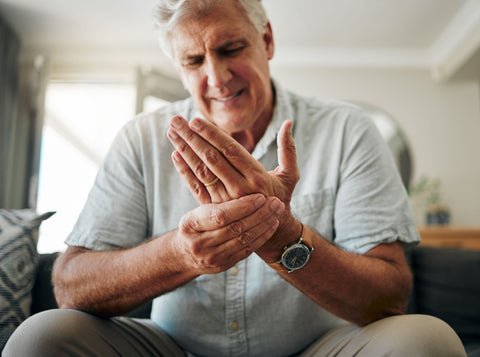Osteoporosis is thought to affect more than 3 million people in the UK, but it’s suspected that many more people could have or be at risk of developing the condition and not be aware of it, especially if over the age of 50. Osteoporosis weakens bones and makes them much more fragile and likely to break, with more than half a million fractures annually because of the condition.
In this article, we look at the signs of osteoporosis to look out for in the elderly and more about the condition, what to do if you think an older loved one has osteoporosis and what potential prevention, treatment or management options are available.
Jump to:
- What is osteoporosis?
- What causes osteoporosis?
- What are the early warning signs of osteoporosis?
- Treatment for osteoporosis in elderly people
- Lifestyle changes to help
- Peace of mind if your older loved one has osteoporosis
What is osteoporosis?

Osteoporosis is a condition that develops over time and causes bones to become more fragile. This can mean that broken bones become more common, even resulting from normal daily activities. Weakened bones due to osteoporosis that can often be most vulnerable include wrists, hips and the spine.
What causes osteoporosis?
There isn’t any one thing that causes osteoporosis, but age is considered to be a major factor, with most people with the condition aged 50 or older. Bone is a living tissue that our bodies replace as needed, but the cells that produce new bone can slow down in later life and are unable to replace the old bone at the same rate. This means the bones become weaker as bone tissue is lost.
Other risk factors for osteoporosis include:
- Gender, with women more likely to develop osteoporosis due to hormonal changes during menopause and smaller bones, on average, to start with
- A family history of osteoporosis
- Having other medical conditions, such as diabetes, hyperthyroidism, rheumatoid arthritis and Crohn’s disease
- Being on certain medications long-term, such as steroids
- Being underweight or having been underweight in the past
- Having a sedentary lifestyle
- Being a smoker
- Excessive alcohol use
- Eating a diet that doesn’t contain enough calcium or vitamin D.
What are the early warning signs of osteoporosis?
Osteoporosis is often known as a ‘silent condition’ because there are usually no symptoms or other indications that someone’s bones are weakening over time, until they experience a fracture or another bone injury.
However, there can be some signs that osteoporosis is present in the spine in some cases. These can include:
- Significant back pain
- Noticeable loss of height or a change in normal posture
- A curve developing in the spine
If you notice any of these signs in yourself or an older loved one, it’s important to speak to a medical professional.
Other than this, often the first sign that someone has developed osteoporosis is when they break a bone, and a scan will often reveal that bone density has become low.
There is a stage when bone density starts to decrease, but not to the level that you would be diagnosed as having osteoporosis. This is called osteopenia and means that your bone density is below average for someone your age, but it may or may not mean that you go on to develop osteoporosis. It is diagnosed with a bone density scan. Your doctor can recommend a treatment plan for osteopenia to help reduce the chances that you will go on to develop osteoporosis.
Treatment for osteoporosis in elderly people
There are a number of different treatment options for elderly people with osteoporosis and it’s common for medical professionals to recommend a combination of these, which may include:
Prescription medications
There are various types of medication that may be prescribed for osteoporosis (or sometimes for osteopenia), such as:
- Bisphosphonates, which slow down the rate at which bone is broken down by your body. Usually in a tablet or liquid form but may also be given as an injection.
- Selective oestrogen receptor modulators (SERMs), which is only given to women after the menopause and is a daily tablet.
- Biological medicines, which can help to slow down the rate of bone density loss or increase the rate your cells can build new bone and is a regular injection.
- Hormone treatments, which can help increase bone density and are usually a daily injection.
- HRT, which can help keep bones stronger and can come in various forms, including tablets, patches, gel and spray.
As with most medications, there can be various side effects experienced by those taking them and not every medication available might be right for everyone, so it may be a matter of trying a few different options to see what works best for every individual.
Supplements
There are two main supplements that may be able to help if you’ve been diagnosed with osteoporosis.
- Calcium is the main mineral in our bones and ensuring that we have enough of it can help keep bones healthy. Most people can get all of the calcium needed from a healthy and balanced diet, but those with osteoporosis may benefit from taking a supplement of calcium too.
-
Vitamin D in the body helps it to absorb calcium properly. Most people are able to get the vitamin D needed through exposure to sunlight during spring and summer but may need to take a supplement through the autumn and winter. If an older adult is housebound or rarely goes outdoors, they may need to take a vitamin D supplement all year round.
Lifestyle changes to help prevent osteoporosis
There are some lifestyle changes you may be able to make to help prevent osteoporosis from developing in the first place, or can help minimise the progression of the condition and its impact on your life if you already have it.
Exercise
Suitable weight-bearing exercises can help maintain bone strength, so can be ideal for those with or wanting to prevent osteoporosis. This could involve anything from practicing standing up and sitting down again, to walking, dancing and yoga. Those who are mobile and want to be more active could test out some of our recommended sports for elderly people.
Before starting any new exercise regime or sporting activity, you should always speak to your doctor to make sure it’s suitable for your specific circumstances.
Eat a healthy diet that is also rich in calcium

It’s recommended that adults have around 700mg of calcium per day, which can be gained through a healthy balanced diet in most cases. Lots of foods are rich in calcium, including:
- Dairy products like milk, cheese and yogurt
- Soya products that have been calcium-enriched
- Dried fruit
- Leafy green vegetables
- Bread and other baked goods made with fortified flour
Take a look at our healthy eating tips for more ideas.
Stop smoking and reduce alcohol intake
Both drinking excessive alcohol and smoking over a prolonged period are known to lead to bone loss and can increase the risks of breaking a bone. Cutting out smoking and alcohol, along with taking the other steps mentioned in this article, can help to slow down the progression of bone density loss.
Maintain a healthy body weight
Being underweight can mean that your bones can be more fragile, and there is less muscle or body fat to help protect your bones if you have a fall or impact. At the other end of the scale, obesity can also be bad for bone health and increase the risk of fractures, as well as putting additional strain on joints.
Peace of mind if your older loved one has osteoporosis
If you have an older loved one who is at risk of developing osteoporosis or has been diagnosed with the condition, you might be worried about them, especially when you can’t be there. You might be concerned about the chances of them having a fall or another kind of accident at home or when out and about, and whether they will be able to reach help quickly.
One way to provide peace of mind to you and your older relative or friend is a personal alarm system. Just pressing the button on a wearable pendant alarm or watch alarm will raise an alert with TakingCare’s Emergency Resolution Team, who monitor our personal alarms 24 hours a day, 365 days a year.
Choosing the alarm with the right features for your loved one’s lifestyle and preferences can help boost their confidence and means that help is always available if there is an issue related to their osteoporosis or any other kind of incident or accident that might happen.
Find out more about personal alarms
If you’d like to find out more about our products and find the best option for someone you care, get in touch with our team by calling 0800 085 7371.






